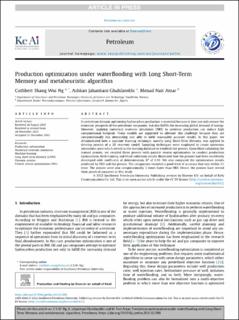Production optimization under waterflooding with Long Short-Term Memory and metaheuristic algorithm
Peer reviewed, Journal article
Published version

Åpne
Permanent lenke
https://hdl.handle.net/11250/2977108Utgivelsesdato
2022Metadata
Vis full innførselSamlinger
Originalversjon
10.1016/j.petlm.2021.12.008Sammendrag
In petroleum domain, optimizing hydrocarbon production is essential because it does not only ensure the economic prospects of the petroleum companies, but also fulfills the increasing global demand of energy. However, applying numerical reservoir simulation (NRS) to optimize production can induce high computational footprint. Proxy models are suggested to alleviate this challenge because they are computationally less demanding and able to yield reasonably accurate results. In this paper, we demonstrated how a machine learning technique, namely Long Short-Term Memory, was applied to develop proxies of a 3D reservoir model. Sampling techniques were employed to create numerous simulation cases which served as the training database to establish the proxies. Upon blind validating the trained proxies, we coupled these proxies with particle swarm optimization to conduct production optimization. Both training and blind validation results illustrated that the proxies had been excellently developed with coefficient of determination, R2 of 0.99. We also compared the optimization results produced by NRS and the proxies. The comparison recorded a good level of accuracy that was within 3% error. The proxies were also computationally 3 times faster than NRS. Hence, the proxies have served their practical purposes in this study.
